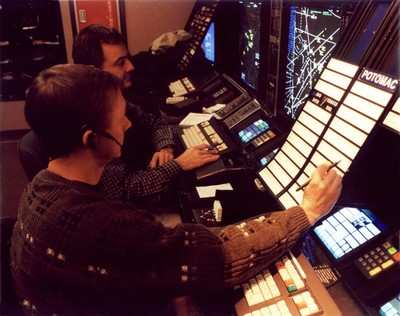Wants To Force Agency Back To Labor Negotiations
 In part one of this
report, you read about NATCA's concern with the FAA's staffing
policies. Atlanta tower controller Gary Brittain related an
incident that almost led to disaster when a controller cleared a
jet for takeoff into landing traffic -- an incident he blames on
fatigue resulting from inadequate staffing. Today ANN concludes its
coverage of NATCA's press conference. Click here to read part
one.
In part one of this
report, you read about NATCA's concern with the FAA's staffing
policies. Atlanta tower controller Gary Brittain related an
incident that almost led to disaster when a controller cleared a
jet for takeoff into landing traffic -- an incident he blames on
fatigue resulting from inadequate staffing. Today ANN concludes its
coverage of NATCA's press conference. Click here to read part
one.
Jeff Richards with Chicago ARTCC recounted another incident
where he believes staffing affected safety. He said a Skywest
commuter inbound to O'Hare and a Northwest 757 out of Detroit came
within 1.79 miles of each other as two controllers discussed new
equipment -- under evaluation at Chicago ARTCC -- designed to meter
traffic into busy airports.
According to Richards, one of the two controllers was not
certified to use the equipment because he had received no training.
Richards said tight staffing precluded time off the floor for
training. The non-certified controller asked the other a question
about using the equipment which distracted her as she cleared the
Skywest plane to descend through the 757's flight path. The two
aircraft were nose to nose at under two miles before the Skywest
aircraft descended clear of the 757.
Tony Vella of SoCal TRACON said he's concerned about the number
of new controllers inbound to his facility. He says his TRACON
should be manned at 261 controllers, but over the last three years
has seen the number drop to 188, plus 23 trainees. He said between
now and October, SoCal TRACON is to receive 55 - 65 new
controllers, only 10 with prior experience.
"Looking at those numbers it really indicates the agency is
starting to understand how drastically and severely it's
underestimated the wave of controller retirements," said Vella.
"The agency is trying to make up on lost time, but they're out of
time -- the time has come and gone."
 And Vella is very concerned
about training the incoming controllers. Under the old contract,
new hires with the FAA started at less busy, less stressful
facilities while they learned the skills necessary to do the job.
Now, new hires go directly to facilities like SoCal
TRACON, which Vella said handled 2.3 million operations last
year -- that's upward of 7,200 aircraft on the busiest days.
And Vella is very concerned
about training the incoming controllers. Under the old contract,
new hires with the FAA started at less busy, less stressful
facilities while they learned the skills necessary to do the job.
Now, new hires go directly to facilities like SoCal
TRACON, which Vella said handled 2.3 million operations last
year -- that's upward of 7,200 aircraft on the busiest days.
Vella said what used to be a six- to fifteen-month process to
prepare an experienced controller for operations at SoCal will now
take three to five years -- because new hires come to the facility
with little to no experience.
And it all comes down to money said NATCA's communications
director Doug Church. "They'd rather bring someone in under a "B"
scale pay system and put them in these busy facilities and take
their chances on whether they make it or not," he said.
With 58 controllers becoming eligible to retire at SoCal TRACON
between now and December, Vella sees no improvement in staffing
either. "The way things are going it will be nothing more that a
'tread water' situation for probably three to five years," he
said.
Additionally, Vella believes putting a new hire to work in the
world's busiest TRACON does that person a disservice. "There is
already enough pressure as it is. It's busy; it's extreme; it's
relentless; and it does not stop," he said.

NATCA expects to publish in the next few weeks washout rates for
new hires it believes will raise many eyebrows. Forrey said the FAA
has those numbers, but refuses to share them. NATCA is compiling
the data for themselves.
Vella believes short staffing is directly related to the number
of operational errors at SoCal TRACON. He claims the facility
logged eight errors in 2004 with staffing under the old contract.
In 2006, the facility saw 22 errors -- almost triple the 2004
number.
Besides staffing and training, Church claims oppressive new work
rules are destroying morale saying, "It resonates, day in and day
out."
Added to the sour feelings, he said, is knowing those rules were
forced on them without benefit of negotiations. "We would like to
have some semblance of a relationship with our employers," Church
added.
Church said the prevailing attitude among the most senior
controllers is disgust with the work environment which leads to
apathy. "They tell me it's just not worth it to come to work
anymore. They say, 'I've made a good living; I've got a decent
retirement; I've done my time -- let someone else put up with the
problems we have here.'"
The FAA has publicly responded to NATCA's repeated warnings of
short staffing with assurances its facilities are manned
appropriately and safely. ANN asked Forrey if he believes the FAA
is lying. Forrey said if it comes to a credibility contest "all you
have to do is look at what [the FAA has] reported in the past. Go
back to Lexington where they say they should have two people on
position at midnight. They only had one, and they knew it. And the
reason they didn't do it is because they didn't want to pay the
overtime; they didn't want to put another body there because they
didn't feel they needed another body there."

Church said the bottom line for controllers is safety. "What we
continue to push as conditions deteriorate is that they slow the
system down and put in more controls to reduce the number of planes
in the air at any given time, or the arrival rates at our
airports."
Meanwhile, he said, the FAA wants to run itself like a private
business allocating costs on a per-operation basis like a private
business -- a development he believes has serious implications. ANN
asked Church if he sees parallels in the FAA's latest funding
proposal and the way it's handled staffing recently.
While declining to say specifically he believes the FAA's
proposal is wrong, he did say NATCA opposes user fees because they
usually lead to privatization, which he believes would be a
disaster for the FAA. He also said NATCA is troubled about the part
of the FAA's proposal that would give control of the nation's
aviation system to a committee headed mostly by the airlines.
"NATCA is very concerned about a small contingency of users
essentially running the system under the FAA's proposed user fee
funding plan," he said.
 ANN's Daily Aero-Linx (05.06.25)
ANN's Daily Aero-Linx (05.06.25) ANN's Daily Aero-Term (05.06.25): Ultrahigh Frequency (UHF)
ANN's Daily Aero-Term (05.06.25): Ultrahigh Frequency (UHF) ANN FAQ: Q&A 101
ANN FAQ: Q&A 101 Classic Aero-TV: Virtual Reality Painting--PPG Leverages Technology for Training
Classic Aero-TV: Virtual Reality Painting--PPG Leverages Technology for Training Airborne 05.02.25: Joby Crewed Milestone, Diamond Club, Canadian Pilot Insurance
Airborne 05.02.25: Joby Crewed Milestone, Diamond Club, Canadian Pilot Insurance






